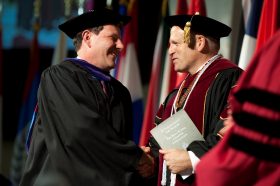Pulitzer Prize-winning New York Times columnist Nicholas Kristof called on students during a convocation speech Tuesday to find causes they care about and take steps wherever they are to make a difference in the world.
In a speech titled “A Call to Action: Encouraging Young People to Join the ‘World’s Fight’ and Take on a Cause Larger than Themselves,” Kristof said that by engaging in worthy causes students will give meaning to their lives.
“The ultimate aspiration is to connect to some cause larger than yourself and try to make a difference in doing that,” Kristof said.
Kristof, a journalist who has written about some of the world’s most intractable problems from global poverty to genocide, also told students that they had a responsibility to help others in the world less fortunate than those lucky enough to be born in America.
“The fact that we are in this room today means that we have all won the lottery of life,” Kristof said. “The question becomes how we go about discharging that responsibility. So I hope that you will seek in your lives to connect with whatever cause, whatever cause larger than yourself, that gives extra meaning to you.
“I think you will find it gives you perspective. It will give you a little extra measure of happiness. And together we truly can, in increments, help change the world.”
Kristof headlined a daylong celebration of the liberal arts and sciences as Elon University installed its chapter of the Phi Beta Kappa Society during the Convocation for Honors in Alumni Gym.
The annual event is held to honor Dean’s List and President’s List students, the faculty, graduate students, and the upcoming graduating class. During the ceremony, President Leo M. Lambert asked those groups to stand and be recognized for their achievements.
Kristof, a Phi Beta Kappa member and best-selling author, has received two Pulitzer Prizes. He has traveled to 140 countries during his career as a journalist, including the major roads and minor byways of China, Africa, India, and South Asia.
In his reporting and writing, he often offers a compassionate glimpse into global health, poverty, and gender problems in the developing world.
“One of the things that is truly most striking about the world,” Kristof said, “is talent is universal but opportunity is not.”
In his speech, he recounted stories from his travels to highlight how individuals around the world stood up in small deeds every day to resist the sex trade of young girls in Asian brothels, or to help a young African woman get an education, or to assist victims of tribal violence in the Darfur region of Sudan.
“What I have really learned to admire … is those people who work maybe not to solve a problem, but to chip away at it,” Kristof said. “A school or class that may not try to hold a conference on global poverty or global literacy, but will sponsor a particular third grade class in a particular refugee camp somewhere. It will not solve the overall problem, but for those third graders in that class it will be transformative.”
Kristof said he sometimes is asked the question about why people here in America should care about problems elsewhere around the globe. And sometimes, he said, he gets questions about the futility of trying to solve a problem such as global poverty.
“What I have always found is that frankly our efforts to help others at the end of the day have a fairly mixed record,” Kristof said. “but they have almost a perfect record at helping ourselves.”



